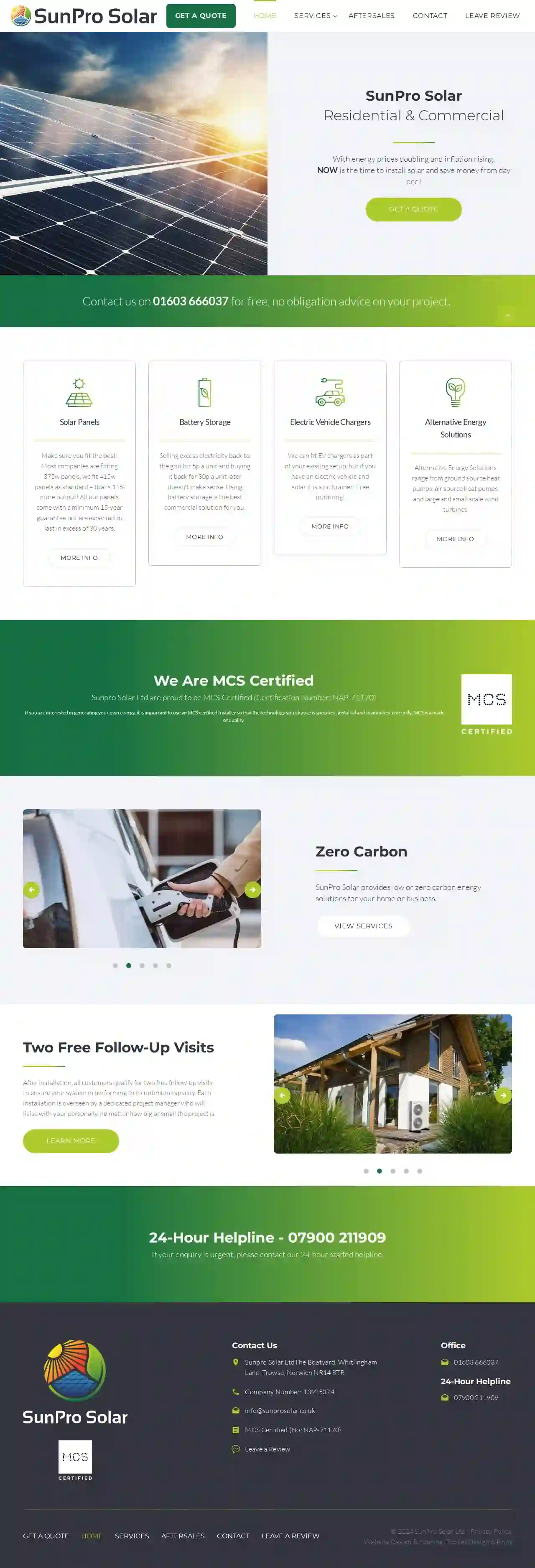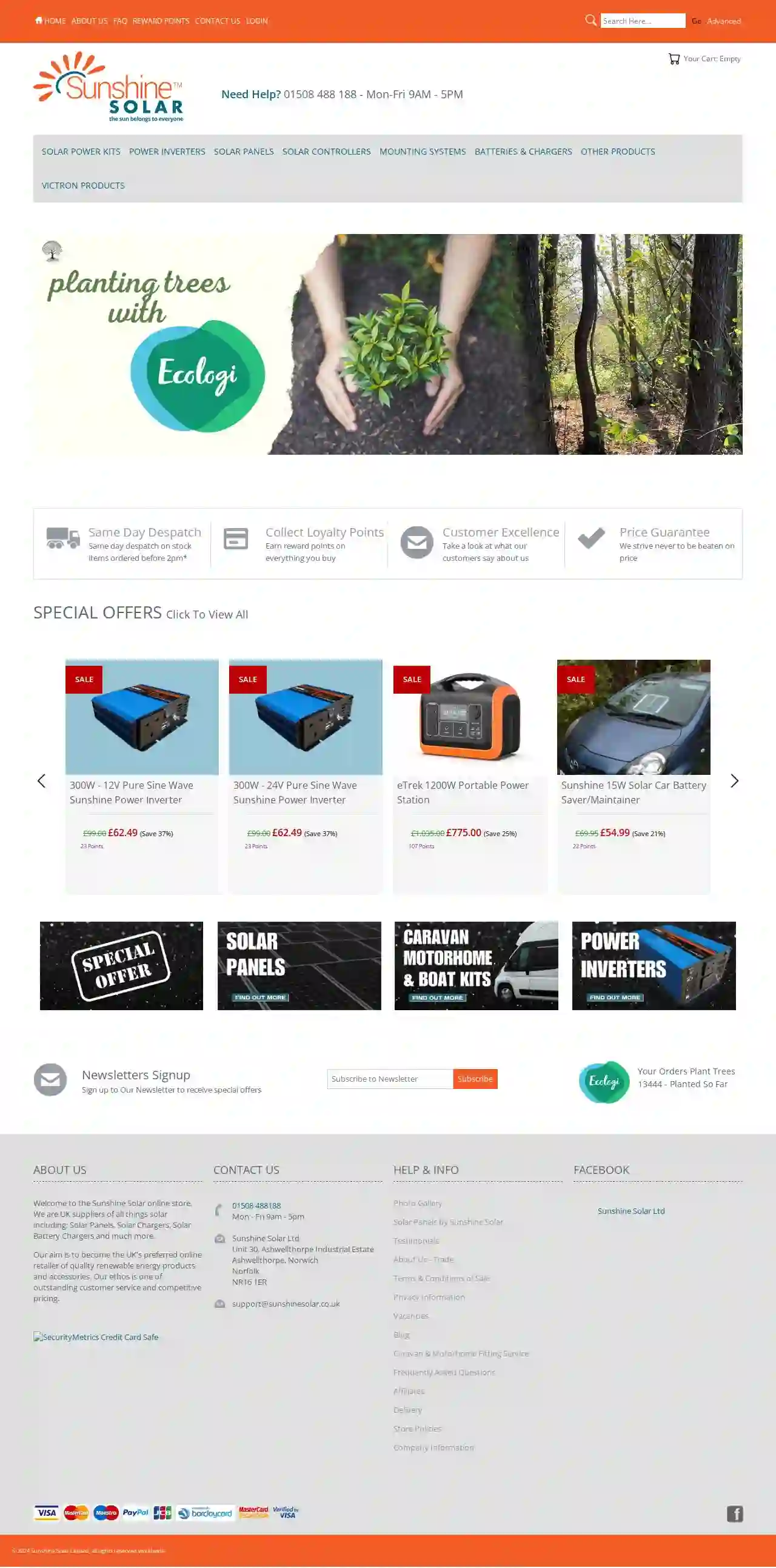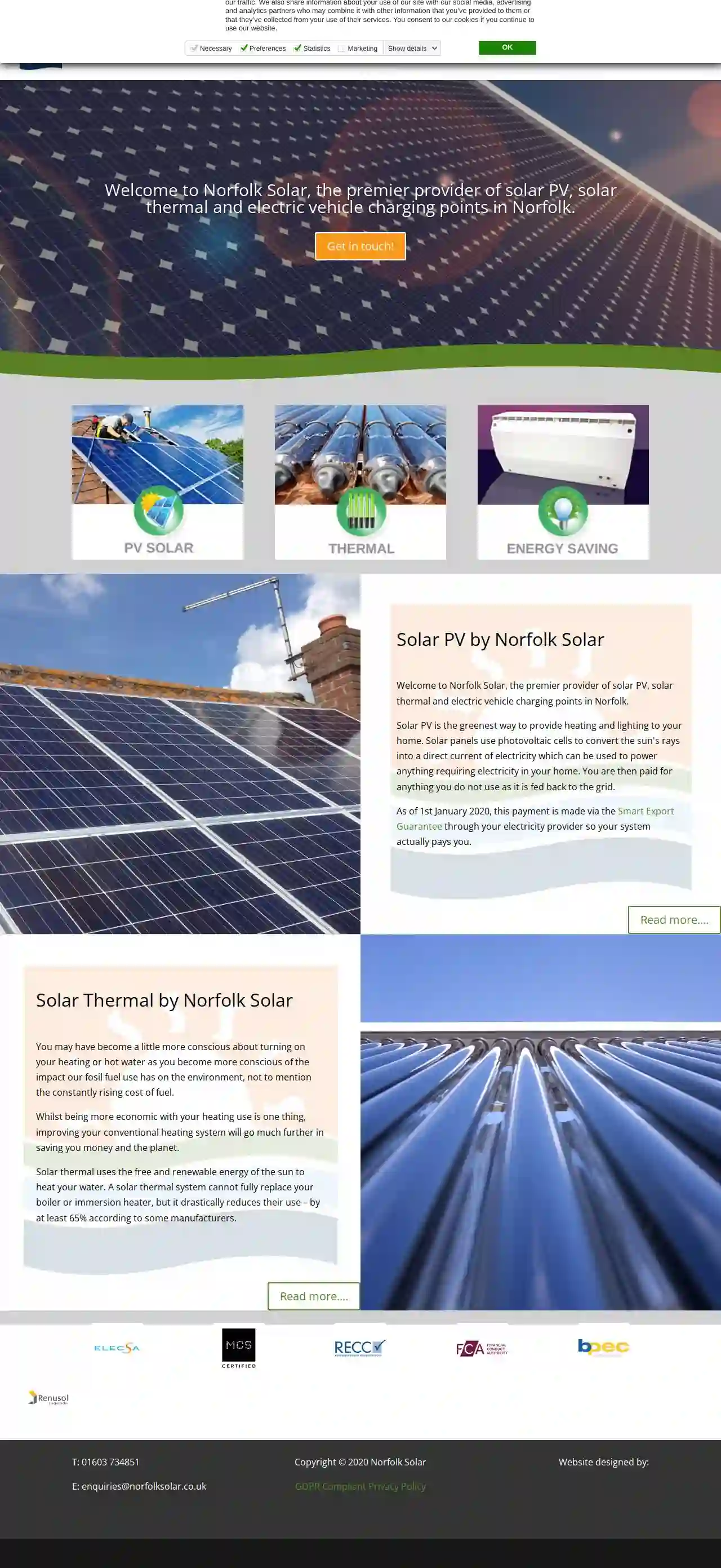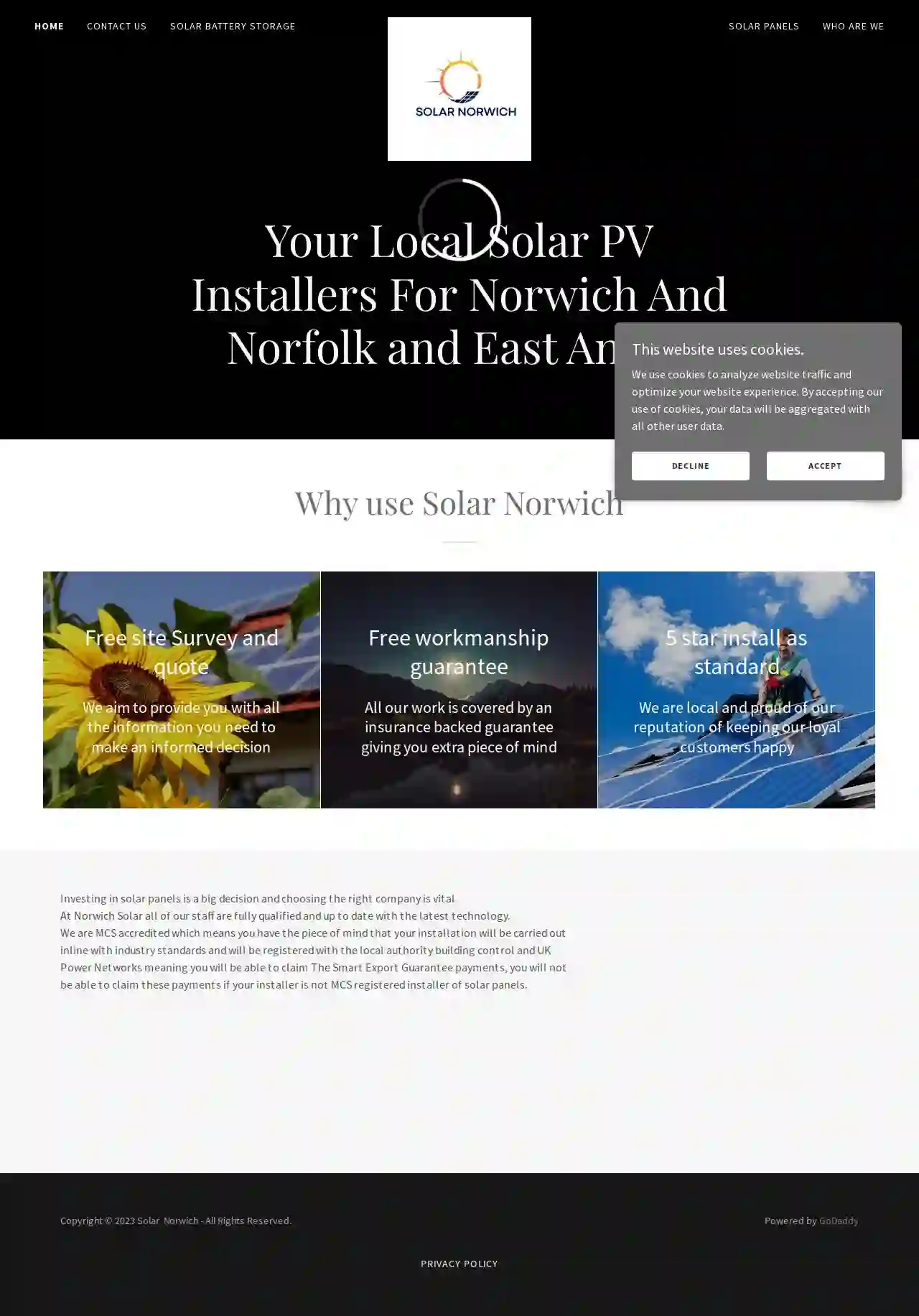Solar Installers Cromer
Find the best Solar Company in Cromer
Receive up to 3 Solar Company quotes for your project today! Compare profiles, reviews, accreditations, portfolio, etc... and choose the best deal.

SunPro Solar Ltd
Whitlingham Lane, Trowse, The Boatyard, Norwich, NR14 8TR, GBSunPro Solar is a residential and commercial solar energy provider based in Norwich, UK. We specialize in providing high-quality solar panel installations, battery storage solutions, electric vehicle chargers, and alternative energy options. With energy prices rising, SunPro Solar offers a way to save money from day one by generating your own clean energy. We are proud to be MCS Certified (NAP-71170), ensuring our installations meet the highest standards of quality and safety. Our team of dedicated project managers provides personalized service and support throughout the entire process, from initial consultation to after-sales care. We offer two free follow-up visits after installation to ensure your system is performing optimally. For urgent inquiries, our 24-hour helpline is available.
- Services
- Why Us?
- Accreditations
- Gallery
Get Quote
Sunshine Solar Ltd
4.839 reviewsUnit 30, Ashwellthorpe Industrial Estate, Ashwellthorpe, Norwich, NR16 1ER, GBWelcome to the Sunshine Solar online store. We are UK suppliers of all things solar including; Solar Panels, Solar Chargers, Solar Battery Chargers and much more. Our aim is to become the UK's preferred online retailer of quality renewable energy products and accessories. Our ethos is one of outstanding customer service and competitive pricing.
- Services
- Why Us?
- Gallery
Get Quote
Square1 Installations ltd
546 reviews42 Curtis Road, Norwich, NR6 6RB, GBSquare1 Installations Ltd (SQ1i) is your local, qualified, and professional Solar Panel and Battery Storage Services provider in Norwich, Norfolk East Anglia.Square1 Installations is a local solar panel installer in Norwich. We offer design, supply, and installation services for new solar panel systems. We can also diagnose and manage your existing system. Our solar panel systems come with warranties from manufacturers and insurance companies, providing both energy savings and peace of mind. We serve Norfolk and the East of England. Your Expert Solar Energy Partner, We Specialise In Residential And Commercial Solar Solutions Square1 Installations Ltd, your premier solar panel and PV installation company serving Norwich, Norfolk, and surrounding regions. As your trusted solar energy partner, we specialise in residential and commercial solar solutions that harness the power of the sun for clean, renewable energy. Regardless of the project’s size, we treat every client with the utmost care and understanding. When you choose Square1 Installations Ltd (SQ1i) as your local, experienced, professional solar and battery storage company, you become part of our commitment to putting the customer first. clean, renewable energy Our mission is to make sustainable energy accessible to all.25 years of combined experience in the renewable energy industry Our company directors bring over 25 years of combined experience in the renewable energy industry to SQ1i. We have successfully executed a wide range of solar installations, including agricultural ground and roof mount projects, developer collaborations, multi-dwelling schemes, industrial and commercial roofs, educational flat roofs, and numerous residential
- Services
- Why Us?
- Gallery
Get Quote
Solar Panel Funding
4.25 reviewsNorwich, GBSolar Panel Funding is the UK's only non-government solar panel grant scheme, dedicated to helping homeowners install solar panels for free or at affordable rates. We understand the financial burden of rising energy costs and strive to make renewable energy accessible to all. Our mission is to combat fuel poverty by providing qualifying homeowners with fully funded solar panel installations. We also offer various finance options through our trusted installer network for those who may not qualify for grants. We work with the UK's top installation companies, ensuring you receive the best service and competitive pricing. By choosing Solar Panel Funding, you're not only investing in a sustainable future but also contributing to our fight against fuel poverty.
- Services
- Why Us?
- Accreditations
- Gallery
Get Quote
Green Building Renewables | Solar Panels & Air Source Heat Pumps
4.830 reviewsDunnington, York, Unit 9 Chessingham Park, YO19 5SE, GBGreen Building Renewables is a trading name of GoEco Renewables Limited. We are a leading provider of renewable energy solutions, including solar panels, air source heat pumps, ground source heat pumps, underfloor heating, and electric vehicle charging. Our team of experts is dedicated to helping homeowners and businesses reduce their carbon footprint and save money on their energy bills. With a wide range of products and services, we can help you achieve your sustainability goals. Contact us today to learn more and get a free quote.
- Services
- Why Us?
- Accreditations
- Gallery
Get Quote
Norfolk Solar
4.25 reviewsNorwich, GBWelcome to Norfolk Solar, the premier provider of solar PV, solar thermal and electric vehicle charging points in Norfolk. Get in touch! Solar PV by Norfolk Solar Welcome to Norfolk Solar, the premier provider of solar PV, solar thermal and electric vehicle charging points in Norfolk. Solar PV is the greenest way to provide heating and lighting to your home. Solar panels use photovoltaic cells to convert the sun's rays into a direct current of electricity which can be used to power anything requiring electricity in your home. You are then paid for anything you do not use as it is fed back to the grid. As of 1st January 2020, this payment is made via the Smart Export Guarantee through your electricity provider so your system actually pays you. Solar Thermal by Norfolk Solar You may have become a little more conscious about turning on your hot water heating as you hear more about the effect on the environment and the rising cost of fuel. Whilst being more economic with your heating use is one thing, improving your conventional heating system will go much further in saving you money and the planet. Solar thermal uses the free and renewable energy of the sun to heat your water. A solar thermal system cannot fully replace your boiler or immersion heater, but it drastically reduces their use – by at least 65% according to some manufacturers.
- Services
- Why Us?
- Gallery
Get Quote
Value Back Solar
4.918 reviewsNorwich, GBEmpowering your tomorrow with solar energy solutions today Many of our customers have already taken a step towards energy independence with our solar panel installation with battery storage. Generate up to 70%* of your electricity using the sun! Find Out More 100% 5 Star reviews from our customers. No Salespeople No hassle, no pressure, designed by your technical expert Savings Save up to £610* a year on your energy bills Together Commited to all our home and business owners in achieving their environmental goals Home Increase the value of your home. Design Personalised system design for maximum returns Referral Refer a friend or family and earn £100 for each installation How it all comes together… Your solar panels use the suns rays to generate electricity. Use the energy generated from your solar panels to your home. Store the extra energy in your battery to use anytime of the day and night. Get paid for any excess electricity that is sold back to the grid. Your Why According to energysavingtrust installing solar panels can save you up to £610* a year on your home energy bills and as well as around one tonne of carbon per year depending on where you live in the UK. Our Why There are many renewable companies in the marketplace, but we believe Valueback Solar is unique in its focus to bring affordable solar PV solutions to the widest range of people from homeowners whether they live in bricks and mortar houses or the fast growing park home communities to owners of SME businesses. What We Offer Your trusted partner in solar energy. We are a full-service solar company committed to providing innovative and sustainable energy solutions for all types of homes, including houses, bungalows, park homes and businesses. Qualified Electricians Our qualified Electrical installation partner will undertake all aspects of the installation. Accredited We are proud to work with our installation partner who are members of MCS, RECC, Trust Mark, NICEIC with insurance backed guarantees through IWA giving you the confidence you are in safe hands.
- Services
- Why Us?
- Accreditations
- Gallery
Get Quote
ACS Solar Ltd
Norwich, GBACS Solar is a family run business with over 10 years industry experience, specialising in the design, supply, installation and commissioning of renewable systems for domestic, commercial and industrial applications. Our innovative approach brings accessibility to sustainable energy for homes, commercial, education, retail and hospitality sectors. We design and install and if required look after it. Our highly trained engineers have extensive experience in the field of renewable technology, ensuring you receive the highest quality product and customer service on the market. Following installation of the system, our engineers will commission the system so that you can start saving on your energy bills and receive SEG payments.
- Services
- Why Us?
- Our Team
- Gallery
Get Quote
Solar East Anglia
Norwich, GBSolar East Anglia is a company based in Norfolk & Suffolk, specializing in the design, supply, and installation of solar PV and battery storage systems for commercial and agricultural clients across East Anglia. With 13 years of experience in the solar PV industry, they aim to be the best in the market for both affordability and service. They are proud Flexi-Orb approved installers and offer a range of services including inverter replacement, fault finding, and solar panel maintenance. Solar East Anglia has completed over 800 solar PV installs to date, ranging from 1kW to 720kW. They believe in providing clean, cost-effective energy solutions and helping businesses illuminate their path to a sustainable future.
- Services
- Why Us?
- Accreditations
- Gallery
Get Quote
Solar Norwich
Norwich, GBYour Local Solar PV Installers For Norwich And Norfolk and East Anglia Investing in solar panels is a big decision and choosing the right company is vital.At Norwich Solar all of our staff are fully qualified and up to date with the latest technology.We are MCS accredited which means you have the piece of mind that your installation will be carried out inline with industry standards and will be registered with the local authority building control and UK Power Networks meaning you will be able to claim The Smart Export Guarantee payments, you will not be able to claim these payments if your installer is not MCS registered installer of solar panels.
- Services
- Why Us?
- Accreditations
- Gallery
Get Quote
Over 3,485+ Solar Companies on our directory
Our solar providers operate in Cromer & beyond!
SolarCompaniesHub has curated and vetted the Best Solar Contractors near Cromer. Find a reliable pro today.
Frequently Asked Questions About Solar Installers
- Monocrystalline: Made from a single silicon crystal, known for high efficiency (typically 18-22%) and sleek black appearance.
- Polycrystalline: Made from multiple silicon crystals, slightly less efficient (15-17%) but often more affordable than monocrystalline.
- Thin-film: Made from thin layers of photovoltaic material, lower efficiency (8-12%) but can be flexible and lightweight.
What happens if my roof needs to be replaced after I install solar panels?
What are the different types of solar panels?
Will solar panels work during cloudy days or at night?
Do solar panels increase my home value?
What happens if my roof needs to be replaced after I install solar panels?
What are the different types of solar panels?
- Monocrystalline: Made from a single silicon crystal, known for high efficiency (typically 18-22%) and sleek black appearance.
- Polycrystalline: Made from multiple silicon crystals, slightly less efficient (15-17%) but often more affordable than monocrystalline.
- Thin-film: Made from thin layers of photovoltaic material, lower efficiency (8-12%) but can be flexible and lightweight.